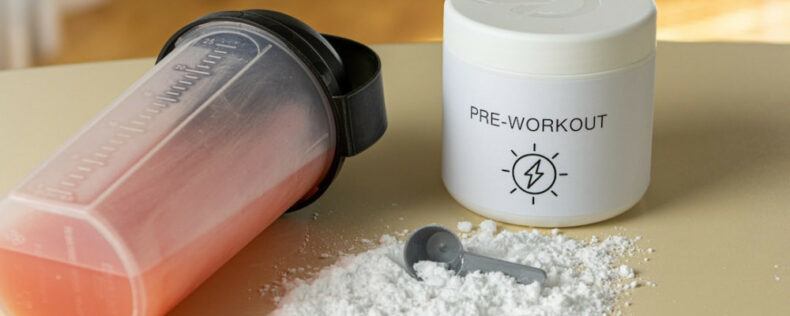If you’re new to working out, you might be curious about the world of pre-workout supplements. You may have heard some different opinions on whether or not you should actually use them, and from those who’ve used them, you may have heard both positive and negative experiences. The use of pre-workout seems to be a rather polarizing topic, so in this post I want to help you decide, is pre-workout necessary for you?
To answer this question, we first need to know what pre-workout supplements are and what the ingredients in them actually do. From there, we’ll cover whether these supplements are safe to consume and whether you should use them in your own routine.
What Is Pre-Workout?
Pre-workout is a supplement that’s meant to improve your performance in the gym. More specifically, some of its main functions include increasing energy, boosting strength, and reducing fatigue.
It often comes in powder form that’s meant to be mixed in liquid and, as the name suggests, taken before your workout.
Active Ingredients in Pre-Workout
In order to achieve their intended purpose, most pre-workouts contain a few common ingredients, which I’ll briefly describe below:
L-Citrulline
This gives you more energy by producing nitric oxide, which increases blood flow to deliver oxygen and nutrients more easily to your muscles when they’re being heavily exerted.
BCAAs
Branched-chain amino acids, or BCAAs, include leucine, isoleucine, and valine. These amino acids can reduce soreness and improve muscle recovery after working out.
Beta-alanine
This increases endurance by reducing muscle fatigue. However, a common side effect of this ingredient is a tingling, itchy sensation, which is often to blame for people’s negative experiences with pre-workout. While too much of it can definitely be distracting and uncomfortable, I personally like feeling a little bit of this effect because it makes me more energized and alert.
If this is something you’re particularly concerned about, make sure to pay extra attention to this ingredient when reading the nutrition labels of different pre-workout supplements. Some pre-workouts tend to have relatively high amounts of beta-alanine, such as Legion Pulse Pre-Workout, which contains 3.6 grams per serving. This may lead to enhanced performance, but also more intense side effects. On the other hand, pre-workouts like Kaged Pre-Kaged Pre-Workout, which contains a more moderate 1.6 grams per serving, should be enough to stimulate you without becoming too overwhelming.
Caffeine
You’re probably very familiar with this stimulant and its ability to increase energy and focus. While the other ingredients in this list can be taken throughout the day to maximize gym performance, caffeine is the main reason pre-workouts should be taken right before working out, since its effects only last for a specific period of time.
Most pre-workouts contain between 200-300 milligrams of caffeine per serving, which is equal to about 2-3 cups of coffee. However, if you already get a lot of caffeine throughout the day, or you simply want to avoid it, stimulant-free pre-workouts like Swolverine Pre-Workout can be a good option as they don’t contain any caffeine. Additionally, some stimulant-free pre-workouts like Huge Supplements Pump Serum Stim-Free Pre-Workout also don’t contain any caffeine or beta-alanine.
Creatine
This is something that’s naturally produced by your body. However, you can further supplement and maximize your body’s creatine stores to take full advantage of its benefit, which is to provide short bursts of additional energy. This can be especially helpful during high-intensity exercises.
While pre-workout supplements that contain creatine can help increase your creatine levels, you’re better off taking standalone creatine supplements, which are more effective and cost-efficient, if this becomes something you want to prioritize.
Is It Safe?
Although you can see that pre-workout supplements have their benefits, there are certainly some concerns related to taking them all the time in significant quantities.

First of all, unless you’re using a stimulant-free pre-workout, most pre-workout supplements contain high doses of caffeine. Caffeine is a well-studied substance, and it’s been shown that too much of it can lead to a variety of issues over time, including anxiety, increased heart rate, and insomnia, not to mention the side effects of developing a caffeine addiction.
As for the other ingredients, it only gets more complicated. That’s because pre-workout supplements aren’t strictly regulated. The rules that govern these supplements are very loose, so companies don’t necessarily have to clearly label all of their ingredients. As a result, it’s important to acknowledge the risk that some pre-workouts may contain substances that aren’t ideal for human consumption.
Some brands, like the ones I’ve recommended above, are generally known to use clean ingredients and be more transparent with their labeling, but even then, it’s hard to be absolutely sure of what you’re putting into your body.
As for the ingredients that aren’t harmful and are supposed to be good for you, the research also just isn’t thorough enough on the long-term health impacts of consistently consuming them in relatively large quantities.
Should You Use Pre-Workout?
For most beginner and casual weightlifters, it’s probably not necessary to turn to pre-workout supplements. For beginners, increasing your energy and strength capacity isn’t nearly as important as focusing on other elements like developing an effective, consistent workout routine and optimizing your diet and recovery. Casual lifters who aren’t aiming to lift super heavy weights won’t find much need for something that primarily serves to help you maximize your strength potential.
If, however, you’re someone who’s been training for a while and is trying to build significant muscle, and you think that a pre-workout might give you that extra kick you need, feel free to try any of the supplements I’ve linked above, or any that appeal to you upon doing your own research. My recommendation, though, is to try and use it only when you really need it.
Don’t just take it out of habit and become dependent on it to the point at which you feel like you need it before every workout. Personally, I only use pre-workout on days when I’m doing heavy compound lifts like benching and shoulder pressing, where my main goal is to increase strength through high weight rather than high reps.
In addition, if you’re looking for ways to increase your energy and improve your performance at the gym, I’d also suggest first experimenting with more natural alternatives. Try drinking coffee or having some fast-digesting carbohydrates as a snack before you train, or try to get more sleep at night so you feel more refreshed all throughout the day. With these, you may just be able to replicate the benefits of pre-workout while avoiding the potential downsides.

